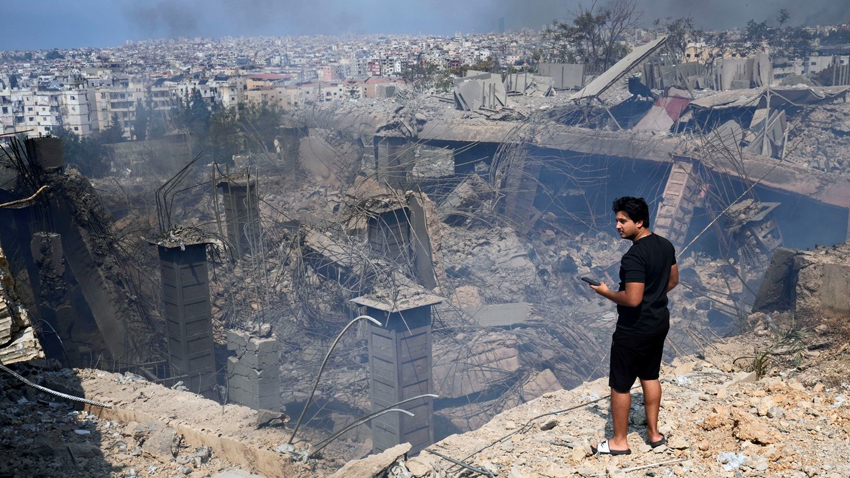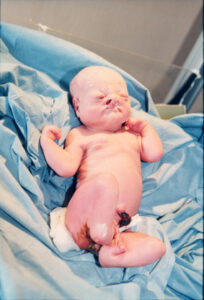
‘AS the Israeli regime’s bombing campaign against Lebanon continues to claim innocent lives, the indiscriminate use of internationally banned weapons has come under the spotlight.
International law experts say the Israeli regime is flagrantly breaking international conventions by using banned weapons that use depleted uranium such as phosphorus bombs, smart guided bombs, and, lately, bunker-buster bombs which are designed to deeply penetrate the ground.
Dr Ali Matar, a Lebanon-based legal and military expert, in a television interview, said that the Israeli regime has breached many international laws that ban the use of these weapons, such as the law that regulates engagement rules, the Fourth Geneva Conventions, and the Hague Regulations.
The Fourth Geneva Convention protects civilians during times of war, including in occupied territories. These conventions are supposed to be a safeguard of international humanitarian law across the world, reflecting a global consensus on the dignity inherent in all human lives.
He said the large-scale destruction of property and killing of civilians carried out unlawfully and shamelessly amounts to a grave breach of the Fourth Geneva Convention and is a war crime.
“What we see in Lebanon is a mass breach to these international laws; a systematic destruction of the South, the Bekaa and Beirut’s Southern suburb (Dahiyeh), in what is clearly a genocide and mass destruction; Israel has killed hundreds of civilians in less than a month,” he said.
According to the expert, Israeli crimes against Lebanon and the Gaza Strip are taking place without genuine engagement from the international community, and this is clear evidence that these conventions exist only as words on paper that have no real value and cannot save any country from the savageness of the apartheid Israeli regime which has crossed all limits.
“Lebanon is just another Gaza now, with Israel using mass destruction weapons at the time international bodies and the majority of Western and Arab countries remain silent,” Matar asserted.
The bombing of the capital Beirut and its suburbs with missiles containing depleted uranium and chemicals not only aims to destroy the infrastructure of the country but also poison the soil, air, water, and bodies of thousands of people, according to experts.
On 27 September, Israeli occupation forces dropped over 80 tons of explosives when F-35 aircraft carried out an aggression on the southern suburb of Beirut using bunker-buster bombs, which contained depleted uranium (DU).
In the aftermath, six buildings were razed to the ground and a massive and deep crater was formed in the devastating bombing that led to the assassination of Hezbollah leader Sayyed Hassan Nasrallah and a number of his companions.
In other attacks across the suburb, Israeli media reported that 2,000 tons of explosives were dropped using the same technique, leaving deep craters behind. Despite the scale of the assault, Israeli media reported the failure of the aggression’s goal.
The aggression comes as international bodies, including the United Nations, remain paralysed, watching the horror unfold as mute spectators.
Dr Mohamad Kanso, professor of international law at the Lebanese University, has pointed out that the Israeli army has indiscriminately used white phosphorus in violation of international humanitarian law.
“The unlawful use of white phosphorus in Lebanon in different populated areas including Aita al-Shaab, Dhayra and al-Mari has seriously endangered the lives of civilians, many of whom were hospitalised and displaced, and whose homes and cars were burned and turned into ashes,” he said.
According to human rights organisations, the use of white phosphorus is restricted under international humanitarian law. Although there can be lawful uses, it must never be fired at, or in close proximity to, a populated civilian area or civilian infrastructure, due to the high likelihood that the fires and smoke it causes spread.
Dr Kanso said that white phosphorus is an incendiary weapon and its use is governed by Protocol III of the Convention on Conventional Weapons (CCW).
“Protocol III prohibits the use of airdropped incendiary weapons in ‘concentrations of civilians’, and defines incendiary weapons as ones ‘primarily designed’ to set fires and burn people, excluding uses of incendiary weapons for other purposes, including as smokescreens,” he said.
“Even though Lebanon acceded to the protocol in 2017, unlike the Israeli regime, it does not mean that Israel can use harmful and deadly weapons to kill civilians in the savage manner we see across Lebanon and Gaza,” he asserted.
As for GBU missiles, the expert explained that these are guided bombs, also known as smart bombs, guided bomb units, or GBU – a precision-guided munition designed to penetrate heavily reinforced concrete or steel structures owing to the casing made of depleted uranium.
‘The use of these prohibited and destructive weapons has not upheld the principle of proportionality and violates international humanitarian law’ he said.
According to a report issued by the UN Human Rights, GBU missiles are extremely large and heavy munitions that can be air-dropped to penetrate through several floors of concrete.
The unit munition can be precisely programmed, or guided, directly onto the target with a very high degree of accuracy. The most common type of explosives inside these missiles are bombs classified as “GBU-31”.
Dr Kanso also pointed out that Israel has not been held accountable for its barbaric actions and crimes against humanity at the UN Security Council.
“In this case, the General Assembly must intervene in order to preserve peace and security in light of such circumstances,” he said.
Established in 1945 by countries that had been victorious in World War II, the United Nations (UN) was founded with the principle mandate of promoting global peace and security, supposedly protecting human rights and upholding international law.
However, Dr Kanso noted that the UN has proven to be a ‘great disappointment’.
The US alone has vetoed resolutions against Israel a total of 46 times, including over its invasion of southern Lebanon as well as its annexation of the Syrian Golan Heights.
The expert said Lebanon must ask the International Criminal Court to hold Israel accountable for its war crimes, but added that he is not very hopeful that this step could be fruitful.
‘Unfortunately, the majority of international organisations are politicised, and hence Israel as usual gets away with all its heinous crimes without any accountability,’ he noted.
Environmental, health crisis
Professor Jihad Abboud, the president of the Syndicate of Chemists in Lebanon, said he fears hundreds, if not thousands, of people will be afflicted with various diseases caused by DU and chemical weapons.
The Syndicate of Chemists in Lebanon (SCL) warned on Sunday that the scale of destruction and the depth of damage to buildings and the ground suggest the use of internationally banned bombs containing depleted uranium by Israeli regime forces.
He noted that ‘the bombing of the southern suburbs of Beirut with depleted uranium not only has a major impact on the environment but also the health and lives of the people. The use of these weapons will cause an environmental and health crisis.’
In terms of the environmental impact of the use of DU weapons, Professor Abboud said: “The most important of these is the contamination of the soil and groundwater. The force of the explosions blows dust saturated with this metal to a distance of 2km, contaminating large residential areas.”
Abboud, who is also a Lecturer at the Lebanese University with the rank of professor, explained that anyone who inhales this dust is at risk of kidney failure, irregular functioning of vital organs, and even the possibility of contracting cancerous diseases.
“Lebanon is a country that is unable to verify the areas contaminated with uranium to isolate them. And as we see daily, citizens are calling their friends and relatives from under the rubble to detect their location and save them, and this exposes the rescuers to this toxic dust,’ he warned.
‘Also, after the war ends, if the cities destroyed by the bombing are rebuilt, there will be a high probability that many will contract serious diseases.’
An Israeli-made catastrophe
Another expert, a fellow researcher at a Lebanese university Dr Doaa Saeed has also warned that the use of DU weapons can cause serious diseases upon inhalation of even a very small amount of insoluble uranium particles, including serious brain, lung, kidney, and liver damage, especially lung cancer.
Recalling that the first country to use DU weapons was the United States during the First Gulf War, Dr Saeed said that in addition to diseases spread among Iraqis who were bombed by DU weapons, there were also high rates of birth defects among people living in the areas that were bombed by these banned weapons in the following years.
“Israel and the US are starting a catastrophe in Lebanon similar to that we saw in Iraq earlier.
“Let alone the destruction, they are exposing the lives of hundreds of thousands of people to immense danger and deadly diseases, and the effect of the uranium particles is irreversible,” she said.
According to the World Health Organisation (WHO), more than 500,000 cancer cases were detected during the five years following the end of the war back then, in which the US used more than 300 tons of DU weapons in its war against Iraq.
“Uranium is a very dense metal, and depleted uranium can be put on the tips of tank shells, bullets and mortar rounds to increase their ability to penetrate targets,”Dr Saeed continued.
‘This explains the huge deep holes caused by Israeli bombing across Beirut’s Dahiyeh.”
Depleted uranium is naturally occurring uranium that has been stripped of much – but not all – of its radioactive matter. It is a by-product of the process which prepares uranium for use in nuclear power plants and nuclear weapons.
As for thermobaric weapons, also known as vacuum bombs, Dr Saeed explained that these bombs contain no less than 40 tons of explosives.
“These cause damage and harm through overpressure and thermal effects, but secondary harm may also occur due to fragmentation, the consumption and depletion of oxygen in the surrounding, as well as the release of toxic gases and smoke, hence causing huge explosions with enormous clouds.”
She further explained that these weapons “strike the target, cause a small explosion that releases a cloud of explosive material, and then a second explosion ignites a massive blast that is capable of vapourising human bodies.”
Destroying the ecosystem
Seconding what Abboud and Saeed said, environmental expert, Dr Fatima Fahs, said that the Israeli occupation army is using poisonous and lethal chemical substances in the weapons used in its war on Lebanon.
She warned these dangerous gases are smelled and inhaled not only by people present at the bombing sites but also by those hundreds of metres away.
“The odour of these chemical substances is causing civilians suffocation, eye burning, and skin allergies,” she noted.
 Baby born in Iraq with severe abnormalities due to the US ombing the country with depleted uranium weapons
Baby born in Iraq with severe abnormalities due to the US ombing the country with depleted uranium weapons
“The effect of the toxic chemical substances lasts for hundreds if not thousands of years, and this is no exaggeration, we saw this in the Hiroshima attacks.
“The most dangerous of these chemical weapons are the ones that cause birth defects due to genetic mutations, severe external and internal burns, as well as different types of cancers.
“Such weapons are used by the US in its wars against oppressed people like the case of Iraq, or by Israel in its war on Gaza and now on Lebanon.
“Toxins from chemical weapons impact all living things and destroy the ecosystem.
“When bombs explode, the toxic metals leach into groundwater, which requires neutralising and cleaning these waters which are no longer good for use, and this will be a serious issue that the Lebanese state will have to address after the war comes to an end,” Dr Fahs warned.’